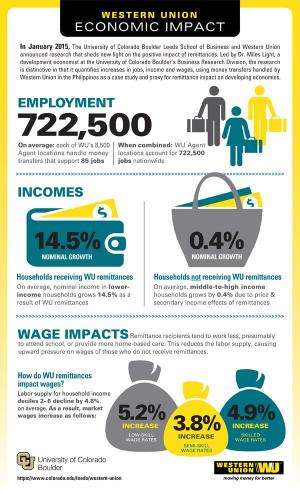Money sent home by migrant workers is major economic boost for developing nations, says study

Remittances, or money transfers, sent home by migrant workers to developing nations play a key role in reducing poverty and improving welfare in recipient countries, according to a University of Colorado Boulder study.
Money transfers also have surpassed funding levels provided by international agencies such as the World Bank and the U.S. Agency for International Development, found the study. This makes remittance funds increasingly important in countries where donor or aid organizations have reduced their presence.
The study looked at money transfers worldwide, but focused on the Philippines, which is the third largest recipient of remittances behind India and China.
"Money transfers provide a source of income for low- and middle-class people in the Philippines that wouldn't otherwise be there," said Miles Light, CU-Boulder economist and lead author of the study. "The spending by these Filipino recipients in the local economy boosts sales and employment for shops, restaurants and other local businesses."
The study was conducted by the Business Research Division at CU-Boulder's Leeds School of Business in partnership with Western Union, a money transfer services company.
On average, each of the approximately 8,500 Western Union agent locations in the Philippines injects enough money from transfers into the local economy to support 85 full-time jobs, according to the study.
"Total transfers through Western Union alone contributed to more than 720,000 sustained jobs in the Philippines in 2012," said Light. "Total remittances account for 8 percent of the gross domestic product and more than 2 million jobs in the country."
The study found that on average, direct recipients of Western Union Money Transfer transactions saw income grow by 14.5 percent in 2012.
Remittances have allowed some recipients to stop working and instead attend school, raise children or care for elderly relatives, according to the study. This reduction in labor supply results in upward wage pressure, increasing wages for low-skilled workers (+5.2 percent), semi-skilled workers (+3.8 percent) and skilled workers (+4.9 percent) in the Philippines.
"The wage effect benefits all workers, not only transfer recipients," said Light. "While it can result in increased inflation, the net benefit remains highly positive for the Philippines."
The findings also showed how the business of remittances is changing from an informal network into a formalized system.
"This has occurred only over the last two to three years because official transfer costs have fallen dramatically, mostly due to better technologies, which are increasingly online and electronic," said Light.
The study used a novel approach that combined national economic statistics with data provided by Western Union to pinpoint the flow of funds and better characterize transfer recipients. It also captured the impacts of money transfers at the microeconomic level—among households—as opposed to the larger macroeconomic level.
Globally, the largest Filipino migrant worker populations are in the Middle East, with 50 percent of the population residing there; Asia, with 37 percent of the population residing there; and Europe, with 7.5 percent of the population residing there. About 1.9 percent of the Filipino migrant worker population resides in the Americas.
The findings, which challenge previous research that negatively correlates money transfers with economic growth, were announced today by Western Union at the World Economic Forum in Davos, Switzerland.
"We saw an opportunity to help advance understanding in the field as part of our broader commitment to leadership in business and corporate responsibility," said Hikmet Ersek, president and CEO of Western Union. "New insight is critical to creating effective programs around this $542 billion annual global flow of funds, and to the one in seven people globally who compose the mobile workforce."
More information: To view the study visit www.colorado.edu/leeds/western-union.
Provided by University of Colorado at Boulder



















